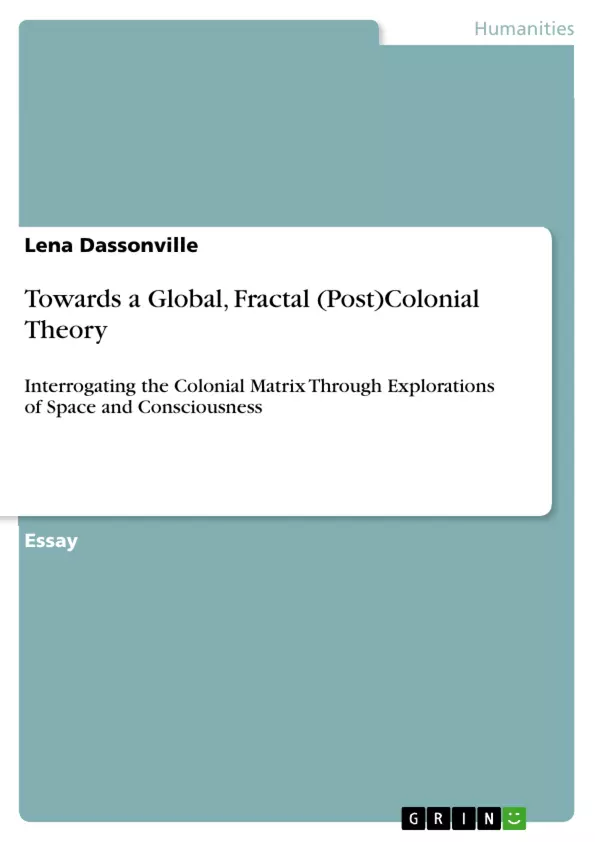Drawing on Denise Ferreira da Silva’s theory of compositional thinking and Kapil Kapoor’s "Decolonizing the Indian Mind", I wish to briefly interrogate the relationship between consciousness and space, and more specifically, probe the connections between identity and geography in the context of colonialism.
Further, building on the work of Jacques Derrida and Katherine McKittrick, I aim to address some of the failings of contemporary critical and (post)colonial theory in regards to how modern leftist, linear theories of the colonial subject persist as detrimental, hauntological renderings. Next, influenced by McKittrick’s "Mathematics Black Life", I intend to deploy a decolonial interpretation that actively revokes and opposes imaginings of anti-indigenous violence rather than sustains it. I train my sights on the anti-colonial work of Kapoor to identify and dwell on instances and spaces of indigenous freedom and resistance.
Ultimately, taking into account Kapoor’s criticisms of the Western economy and by putting Kapoor’s and Karl Marx’s work into conversation with each other, I will analyze how Marxist thought situates itself within a linear context and is unable to extricate itself from the colonial matrix.
Inhaltsverzeichnis (Table of Contents)
- Towards a Global, Fractal (Post)Colonial Theory: Interrogating the Colonial Matrix Through Explorations of Space and Consciousness
- Compositional Thinking: A Fractal Approach to Understanding the Colonial Matrix
- The Interplay of Consciousness and Space: Examining the Relationship Between Identity and Geography in the Context of Colonialism
- Colonialism and the Restructuring of Indigenous Geographies
- Decolonizing the Indian Mind: A Critique of British Colonialism's Ramifications on the Indian Consciousness
Zielsetzung und Themenschwerpunkte (Objectives and Key Themes)
This text aims to interrogate the colonial matrix through an exploration of the relationship between consciousness and space. It utilizes Denise Ferreira da Silva’s theory of compositional thinking to challenge traditional linear interpretations of history and colonialism. The author seeks to uncover the connections between identity and geography within a colonial context, exploring how colonial processes have reshaped indigenous geographies and consciousness. The text draws on the work of Kapil Kapoor, Jacques Derrida, and Katherine McKittrick to deconstruct prevalent (post)colonial theories and offer an alternative perspective.
- Compositional Thinking and its Implications for Understanding Colonialism
- The Interplay of Consciousness and Space in Shaping Identity and Geography
- Colonialism's Restructuring of Indigenous Geographies and its Impact on Identity
- Decolonization of the Mind and Resistance to Colonial Influence
- The Limitations of Linear Thinking in Understanding Colonial Processes
Zusammenfassung der Kapitel (Chapter Summaries)
- The text begins by introducing Silva's concept of compositional thinking, highlighting its significance in understanding the complex interconnections between colonialism, space, and consciousness. This concept challenges traditional linear interpretations of history and provides a framework for exploring the ongoing impact of colonialism on our present.
- Building on Silva's theory, the author delves into the relationship between consciousness and space, examining how identities are shaped by and intertwined with specific geographies. This section explores the interconnectedness of selfhood, society, and the physical environment, particularly within the context of colonial domination.
- Focusing on colonialism's impact on indigenous geographies, the author analyzes how colonial processes have reshaped and restructured these spaces. The text highlights the role of cartography and the manipulation of geographical boundaries in perpetuating colonial power and dispossession.
- Drawing on Kapoor's work, the text explores the colonial imprint on the Indian mind. Kapoor's critique of British colonialism in India provides insights into the ways in which indigenous cultures have been impacted by colonial influences and the strategies employed to resist these influences.
Schlüsselwörter (Keywords)
The central keywords of this text include compositional thinking, colonialism, space, consciousness, geography, identity, decolonization, indigenous knowledge, and the colonial matrix. The text explores how these concepts intertwine to form a complex understanding of colonial power and its enduring impact on societies and individuals.
Frequently Asked Questions
What is "compositional thinking" in postcolonial theory?
Compositional thinking, a concept from Denise Ferreira da Silva, is a fractal approach used to interrogate the colonial matrix by challenging linear interpretations of history and space.
How are identity and geography related in the context of colonialism?
The text explores how colonial processes restructure indigenous geographies, which in turn reshapes the consciousness and identity of the colonial subject.
What does Kapil Kapoor contribute to this decolonial analysis?
Kapil Kapoor’s work "Decolonizing the Indian Mind" is used to critique the ramifications of British colonialism on Indian consciousness and identify spaces of indigenous freedom.
Why is Marxist thought criticized in this text?
The author argues that Marxist thought situates itself within a linear context and is unable to fully extricate itself from the colonial matrix.
What is the role of "hauntology" in this theory?
Drawing on Derrida, the text addresses how modern linear theories of the colonial subject persist as detrimental, "hauntological" renderings that fail to truly decolonize.
- Quote paper
- Lena Dassonville (Author), 2016, Towards a Global, Fractal (Post)Colonial Theory, Munich, GRIN Verlag, https://www.grin.com/document/346594



